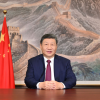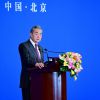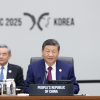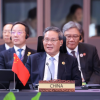热词翻译:“生态文明建设”英文怎么说?
“生态文明建设”英文怎么说?
根据热词译文件报告翻译数据库,在《中共中央关于党的百年奋斗重大成就和历史经验的决议》的翻译中,“生态文明建设”被翻译为:
生态文明建设
ecological advancement
ecological advancement
例句如下:
明确中国特色社会主义事业总体布局是经济建设、政治建设、文化建设、社会建设、生态文明建设五位一体,战略布局是全面建设社会主义现代化国家、全面深化改革、全面依法治国、全面从严治党四个全面;
—The integrated plan for building socialism with Chinese characteristics covers five spheres, namely economic, political, cultural, social, and ecological advancement, and that the comprehensive strategy in this regard includes four prongs, namely building a modern socialist country, deepening reform, advancing law-based governance, and strengthening Party self-governance.
—The integrated plan for building socialism with Chinese characteristics covers five spheres, namely economic, political, cultural, social, and ecological advancement, and that the comprehensive strategy in this regard includes four prongs, namely building a modern socialist country, deepening reform, advancing law-based governance, and strengthening Party self-governance.
改革开放以后,党日益重视生态环境保护。同时,生态文明建设仍然是一个明显短板,资源环境约束趋紧、生态系统退化等问题越来越突出,特别是各类环境污染、生态破坏呈高发态势,成为国土之伤、民生之痛。如果不抓紧扭转生态环境恶化趋势,必将付出极其沉重的代价。
Since the launch of reform and opening up, the Party has paid increasingly greater attention to ecological conservation and environmental protection, a major area in which we are still falling short. China faces increasingly grave problems in the form of tightening environmental and resource constraints and ecological degradation. In particular, environmental pollution and ecological damage of various kinds are becoming increasingly commonplace, impairing our country’s development and people’s wellbeing. We will pay an extremely heavy price unless we reverse the trend of ecological and environmental deterioration as soon as possible.
Since the launch of reform and opening up, the Party has paid increasingly greater attention to ecological conservation and environmental protection, a major area in which we are still falling short. China faces increasingly grave problems in the form of tightening environmental and resource constraints and ecological degradation. In particular, environmental pollution and ecological damage of various kinds are becoming increasingly commonplace, impairing our country’s development and people’s wellbeing. We will pay an extremely heavy price unless we reverse the trend of ecological and environmental deterioration as soon as possible.
党中央强调,生态文明建设是关乎中华民族永续发展的根本大计,保护生态环境就是保护生产力,改善生态环境就是发展生产力,决不以牺牲环境为代价换取一时的经济增长。必须坚持绿水青山就是金山银山的理念,坚持山水林田湖草沙一体化保护和系统治理,像保护眼睛一样保护生态环境,像对待生命一样对待生态环境,更加自觉地推进绿色发展、循环发展、低碳发展,坚持走生产发展、生活富裕、生态良好的文明发展道路。
The Central Committee has emphasized that ecological conservation is of vital importance for the sustainable development of the Chinese nation. To protect the environment is to protect the productive forces, and to improve the environment is to boost the productive forces. We must never sacrifice the environment in exchange for transient economic growth. We must stay true to the principle that lucid waters and lush mountains are invaluable assets, continue our holistic approach to the conservation of mountain, river, forest, farmland, lake, grassland, and desert ecosystems, and protect and cherish our natural environment as we do our own lives. We must act with greater resolve to promote green, circular, and low-carbon development, and adhere to a model of sustainable development featuring increased production, higher living standards, and healthy ecosystems.
The Central Committee has emphasized that ecological conservation is of vital importance for the sustainable development of the Chinese nation. To protect the environment is to protect the productive forces, and to improve the environment is to boost the productive forces. We must never sacrifice the environment in exchange for transient economic growth. We must stay true to the principle that lucid waters and lush mountains are invaluable assets, continue our holistic approach to the conservation of mountain, river, forest, farmland, lake, grassland, and desert ecosystems, and protect and cherish our natural environment as we do our own lives. We must act with greater resolve to promote green, circular, and low-carbon development, and adhere to a model of sustainable development featuring increased production, higher living standards, and healthy ecosystems.
党从思想、法律、体制、组织、作风上全面发力,全方位、全地域、全过程加强生态环境保护,推动划定生态保护红线、环境质量底线、资源利用上线,开展一系列根本性、开创性、长远性工作。党组织实施主体功能区战略,建立健全自然资源资产产权制度、国土空间开发保护制度、生态文明建设目标评价考核制度和责任追究制度、生态补偿制度、河湖长制、林长制、环境保护“党政同责”和“一岗双责”等制度,制定修订相关法律法规。
Through all-out efforts in the areas of theory, law, institutions, organization, and conduct, the Party has strengthened ecological conservation and environment protection in all dimensions and regions and at all times. We have promoted the enforcement of red lines for ecological conservation, set benchmarks for environmental quality, imposed caps on resource utilization, and launched a whole raft of pioneering initiatives that will have fundamental and far-reaching significance. We have worked to implement the functional zoning strategy and set up sound systems in the following areas: property rights for natural resource assets, territorial space development and protection, performance evaluation and accountability for ecological conservation, compensation for ecological conservation, designation of river, lake, and forest chiefs, assignment of equal responsibilities for environmental protection to Party committees and governments, and charging officials with environmental protection responsibilities in addition to their prescribed duties. Corresponding laws and regulations have been formulated and/or revised.
Through all-out efforts in the areas of theory, law, institutions, organization, and conduct, the Party has strengthened ecological conservation and environment protection in all dimensions and regions and at all times. We have promoted the enforcement of red lines for ecological conservation, set benchmarks for environmental quality, imposed caps on resource utilization, and launched a whole raft of pioneering initiatives that will have fundamental and far-reaching significance. We have worked to implement the functional zoning strategy and set up sound systems in the following areas: property rights for natural resource assets, territorial space development and protection, performance evaluation and accountability for ecological conservation, compensation for ecological conservation, designation of river, lake, and forest chiefs, assignment of equal responsibilities for environmental protection to Party committees and governments, and charging officials with environmental protection responsibilities in addition to their prescribed duties. Corresponding laws and regulations have been formulated and/or revised.
党的十八大以来,党中央以前所未有的力度抓生态文明建设,全党全国推动绿色发展的自觉性和主动性显著增强,美丽中国建设迈出重大步伐,我国生态环境保护发生历史性、转折性、全局性变化。
Since the Party’s 18th National Congress, the Central Committee has devoted greater efforts than ever before to ecological conservation. The whole Party and the entire nation have become more conscious and active in pursuing green development, and made significant progress in building a Beautiful China. Our environmental protection endeavors have seen sweeping, historic, and transformative changes.
Since the Party’s 18th National Congress, the Central Committee has devoted greater efforts than ever before to ecological conservation. The whole Party and the entire nation have become more conscious and active in pursuing green development, and made significant progress in building a Beautiful China. Our environmental protection endeavors have seen sweeping, historic, and transformative changes.
热词链接
“生态文明建设”在其他来源中的翻译:
1 《2025年4月24日外交部发言人郭嘉昆主持例行记者会》中“生态文明建设”的翻译
作为2025年第一个启动的大熊猫保护国际合作项目,中奥大熊猫保护合作充分体现了双方建立的良好合作机制和取得的丰硕成果。大熊猫是中国的“国宝”,也是世界人民友谊的使者和桥梁。大熊猫保护既是中国生态文明建设的闪耀名片和全球野生动物保护的成功案例,也为增进中外民间友好发挥了重要作用。中方愿与国际合作伙伴一道,继续在大熊猫等濒危物种保护领域交流合作,为全球生态保护事业作出更大贡献。
As the first international cooperation project on giant panda conservation launched this year, China-Austria cooperation on giant panda conservation fully illustrates a sound cooperation mechanism built by the two countries and fruitful outcomes it has yielded. Giant panda is not only a national treasure of China but also emissaries and bridges for friendship. Giant panda conservation is not only a shining hallmark of China’s ecological conservation and a successful story of global wildlife conservation, but also instrumental in enhancing people-to-people friendship. China is ready to work with international partners to continue our exchanges and cooperation in the protection of giant pandas and other endangered species, and make even greater contributions to global ecological conservation.
As the first international cooperation project on giant panda conservation launched this year, China-Austria cooperation on giant panda conservation fully illustrates a sound cooperation mechanism built by the two countries and fruitful outcomes it has yielded. Giant panda is not only a national treasure of China but also emissaries and bridges for friendship. Giant panda conservation is not only a shining hallmark of China’s ecological conservation and a successful story of global wildlife conservation, but also instrumental in enhancing people-to-people friendship. China is ready to work with international partners to continue our exchanges and cooperation in the protection of giant pandas and other endangered species, and make even greater contributions to global ecological conservation.
2 《《中国的能源转型》白皮书》中“生态文明建设”的翻译
加快发展非化石能源是加强生态文明建设、推动经济社会绿色低碳发展、积极稳妥推进碳达峰碳中和的必然要求,是发展绿色生产力的必由之路。
Accelerating the development of non-fossil energy is a necessary step in pursuing eco-environmental progress, promoting green and low-carbon economic and social development, and achieving the peak carbon and carbon neutrality goals. It is essential to increasing green productivity.
Accelerating the development of non-fossil energy is a necessary step in pursuing eco-environmental progress, promoting green and low-carbon economic and social development, and achieving the peak carbon and carbon neutrality goals. It is essential to increasing green productivity.
3 《《中国的能源转型》白皮书》中“生态文明建设”的翻译
用好能耗双控指挥棒。实施能耗双控是中国加快生态文明建设、推动高质量发展的重要制度性安排。中国适应经济社会发展新形势,将能耗强度下降作为约束性指标,并推动向碳排放双控转变。十年来,中国通过产业结构调整和优化升级,大力发展节能降碳技术和产业,全面提高能源效率,能耗强度持续下降,累计节约能源消费约14亿吨标准煤,减少二氧化碳排放约30亿吨。
Maximizing the policy of dual control over energy use. Controlling both the volume and intensity of energy use is a crucial institutional measure in accelerating eco-environmental progress and pursuing high-quality development. To keep up with the dynamics in its economic and social development, China has set a binding target of lowering energy intensity and has shifted its focus from controlling the volume and intensity of energy use to controlling the volume and intensity of carbon emissions. Over the past decade, through industrial restructuring and upgrading, China has introduced energy-saving and carbon reduction technologies and industries, and raised its energy efficiency across the board. As a result of these efforts, the country’s energy intensity has decreased steadily, leading to energy savings equivalent to about 1.4 billion tonnes of standard coal and reducing carbon dioxide emissions by about 3 billion tonnes.
Maximizing the policy of dual control over energy use. Controlling both the volume and intensity of energy use is a crucial institutional measure in accelerating eco-environmental progress and pursuing high-quality development. To keep up with the dynamics in its economic and social development, China has set a binding target of lowering energy intensity and has shifted its focus from controlling the volume and intensity of energy use to controlling the volume and intensity of carbon emissions. Over the past decade, through industrial restructuring and upgrading, China has introduced energy-saving and carbon reduction technologies and industries, and raised its energy efficiency across the board. As a result of these efforts, the country’s energy intensity has decreased steadily, leading to energy savings equivalent to about 1.4 billion tonnes of standard coal and reducing carbon dioxide emissions by about 3 billion tonnes.

 国家主席习近平发表二〇二六年新年贺词
国家主席习近平发表二〇二六年新年贺词 在历史演进重大关头开拓中国特色大国外交新境界
在历史演进重大关头开拓中国特色大国外交新境界 习近平在亚太经合组织第三十二次领导人非正式会议第一阶段会议上的讲话
习近平在亚太经合组织第三十二次领导人非正式会议第一阶段会议上的讲话 李强在第28次中国—东盟领导人会议上的讲话
李强在第28次中国—东盟领导人会议上的讲话 李强在第20届东亚峰会上的讲话
李强在第20届东亚峰会上的讲话